Political Prisoners (100 found)
“Prison Conditions in Burma and The Potential for Prison Reform” Report
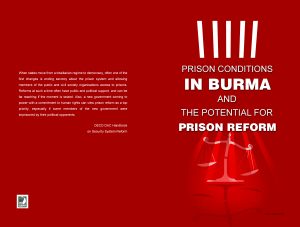 As Burma emerges from decades of authoritarian rule and international isolation, the issue of human rights and human rights abuses has been of large concern to many actors involved. Holding those accountable for crimes committed in the past has been at the forefront for many observers […]
As Burma emerges from decades of authoritarian rule and international isolation, the issue of human rights and human rights abuses has been of large concern to many actors involved. Holding those accountable for crimes committed in the past has been at the forefront for many observers […]
Armed Forces and Democratization in Myanmar: Why the U.S. Military Should Engage the Tatmadaw
Even after the November 2015 landslide electoral victory of Aung San Suu Kyi’s National League for Democracy the armed forces of Myanmar (Burma) continue to be the country’s most powerful political institution […]
• • •NGOs’ Open Letter to Barack Obama regarding Sanctions on Burma
We, the undersigned organizations, write to express our concern regarding the recent report by Human Rights Watch that reveals that the U.S. government “plans to announce the lifting of key sanctions during Burmese leader Aung San Suu Kyi’s visit to Washington, DC,” beginning on September 13.1 Despite the marked democratic progress and peacebuilding activities that have taken place in Burma since last November’s election—which we applaud—there remain a number of pressing issues threatening the stability of the country and its most vulnerable people […]
• • •Human Rights Watch: “They Can Arrest You at Any Time” The Criminalization of Peaceful Expression in Burma
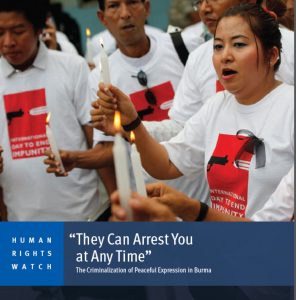 The past five years have been a time of liberalization and change in Burma. The abolition of prior censorship and a loosening of licensing requirements has led to a vibrant press, and the shift from formal military rule has emboldened civil society […]
The past five years have been a time of liberalization and change in Burma. The abolition of prior censorship and a loosening of licensing requirements has led to a vibrant press, and the shift from formal military rule has emboldened civil society […]
Briefing Paper: The legacy of mass torture and the challenge for reform in Myanmar
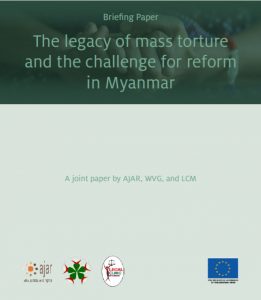 Torture has a long history in Myanmar and has been widely employed by the military regimes in power after 1962 […]
Torture has a long history in Myanmar and has been widely employed by the military regimes in power after 1962 […]
“After release I had to restart my life from the beginning” The Experiences of Ex-political Prisoners in Burma and Challenges to Reintegration
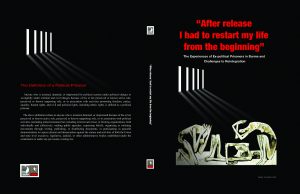 Since 1962, between 7,000 and 10,000 political prisoners have been imprisoned in Burma. Whilst a multitude of anecdotal records exist, there is very little comprehensive data concerning the torture and mistreatment experienced by political prisoners within Burma’s interrogation centers and jails […]
Since 1962, between 7,000 and 10,000 political prisoners have been imprisoned in Burma. Whilst a multitude of anecdotal records exist, there is very little comprehensive data concerning the torture and mistreatment experienced by political prisoners within Burma’s interrogation centers and jails […]
Burma: Country Reports on Human Rights Practices for 2015
Burma has a quasi-parliamentary system of government in which national parliament selects the president and constitutional provisions grant one-quarter of national, regional, and state parliamentary seats to active-duty military appointees […]
• • •Myanmar: Political imprisonment in numbers
Today, Amnesty International released the report New expression meets old repression. Here is a look at some of the key numbers behind the growing crackdown on freedom of expression in Myanmar […]
• • •Myanmar: New expression meets old repression: Ending the cycle of political arrests and imprisonment in Myanmar
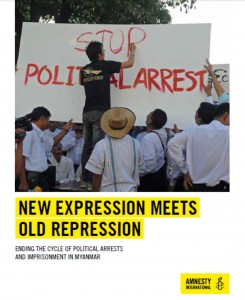 This is the summary of the Amnesty International report which highlights the pattern of politically motivated arrest and imprisonment since the start of 2014. Since it came to power in March 2011, the government in Myanmar has embarked on a major transition from five decades of authoritarian military rule towards a more open political system […]
This is the summary of the Amnesty International report which highlights the pattern of politically motivated arrest and imprisonment since the start of 2014. Since it came to power in March 2011, the government in Myanmar has embarked on a major transition from five decades of authoritarian military rule towards a more open political system […]
Testimony before House Foreign Affairs, Subcommittee on Africa, Global Health, Global Human Rights, and International Organizations: “Get it Right This Time: A Victims-Centered Trafficking in Persons Report”
Mr. Chairman and other distinguished members of the Subcommittee, thank you for inviting me to testify today. I had the honor of testifying last year, and once again my colleagues and I at Fortify Rights thank you for your leadership in working to end human trafficking worldwide […]
• • •
 All posts
All posts